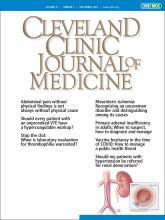Table of Contents
From the Editor
- Abdominal pain without physical findings is not always without physical cause
Mesenteric ischemia is a serious clinical entity characterized by a disconnect between the patient’s symptoms and the physical examination.
1-Minute Consult
- Should every patient with an unprovoked venous thromboembolism have a hypercoagulable workup?
In the absence of consensus guidelines addressing this question, an individualized approach that considers personal and family history is needed.
Editorial
- Stop the clot: When is laboratory evaluation for thrombophilia warranted?
Evidence does not support routine testing for an underlying hereditary thrombophilia after an arterial or venous thrombosis. Instead, the benefits of testing must be discussed with each patient.
1-Minute Consult
- Should my patients with hypertension be referred for renal denervation?
Renal denervation may be appropriate as an alternative or adjunct to pharmacotherapy in certain patients. Shared decision-making is crucial before proceeding.
Review
- Mesenteric ischemia: Recognizing an uncommon disorder and distinguishing among its causes
Mesenteric ischemia is associated with high mortality and often poses a diagnostic challenge. Early recognition and diagnosis are imperative to improve outcomes.
- Primary adrenal insufficiency in adults: When to suspect, how to diagnose and manage
The authors provide a review of primary adrenal insufficiency for clinicians in primary care, emergency medicine, and hospital medicine, who are usually the first clinicians adults with this disorder present to when seeking medical care.





Commentary
It is important to empower patients to be their own advocates while helping them sort through the data on vaccines, emphasizing what we know and where uncertainty remains.